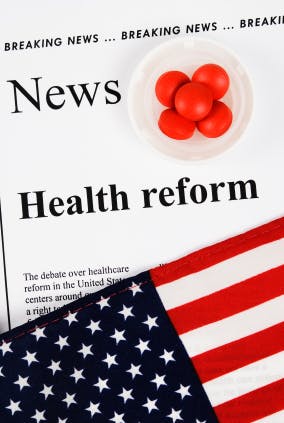Hey HR Pro: Here’s one thing to keep in mind as you and your organization struggle to figure out the ramifications of the federal health care mandates on your business — the rest of America is just as perplexed and confused about it as you are.
The Kaiser Foundation’s monthly Health Tracking Poll for March shows just how divided and confused Americans are about the landmark health care legislation — known in some corners as Obamacare — as it has become a huge focus for managers, executives, and HR professionals everywhere.
Businesses want more guidance about what they need to do, but as the poll results show, people everywhere seem just as confused about it today as they were last year when it first passed.
Here are the results of the Kaiser poll. See if you don’t agree:
- The public remains deeply divided over the landmark health care legislation, a year after President Obama signed health reform into law, with a year of political debate over its merits and the beginning stages of its implementation doing little to alter Americans’ opinions. In March, one year after enactment, 42 percent of Americans hold favorable views of the law while 46 percent view it unfavorably, a basic division that has changed little during the last 12 months. (In April 2010, 46 percent had favorable views and 40 percent unfavorable ones, but both figures have ticked up and down over the last year.) Opinion of the law continues to break sharply along partisan lines, with 71 percent of Democrats backing the law and 82 percent of Republicans opposing it.
- About half (51 percent) of Americans who like the law cite expanded access to insurance and health care as the reason. Those who do not like it give a greater variety of reasons: 20 percent are concerned about costs; 19 percent have concerns about government’s role; and 18 percent mention opposition to the individual mandate.
- A majority of Americans agree on something: 53 percent are confused about the law, the major provisions of which won’t take effect until 2014. This is nearly identical to the 55 percent who reported being confused in April 2010. Further, 52 percent this month say they do not have enough information about health reform to understand how it will impact them personally, while 47 percent think they do. Members of the groups most likely to benefit from health reform — the uninsured and those living in low-income households — are the most likely to say they do not know enough about the law’s potential impacts.
- Two-thirds of Americans agree that states should be able to substitute their own health reform plans provided that they are as comprehensive and affordable as the national one created by the new law. The idea wins majority support across the political spectrum, backed by 75 percent of Republicans, 72 percent of independents and 55 percent of Democrats. But public support for state flexibility drops sharply if people think states would use substitute plans to save money by offering more limited insurance to fewer people than the national plan would. In that case, roughly two in three Americans (65 percent) would oppose state substitution, while 26 percent would still favor it.
- The requirement that nearly every American obtain health insurance – known as the individual mandate – remains unpopular, with 67 percent of the public supporting the repeal of that provision. That view is not an immovable one, however. For instance, support for repealing the mandate fell to 35 percent when those who initially supported repeal were told that “under the reform law, most Americans would still get coverage through their employers and so would automatically satisfy the requirement without having to buy any new insurance.” There was a similar, if smaller, drop in support for the mandate’s repeal to 48 percent when repeal supporters were told that without such a requirement people might wait until they were sick to buy insurance.
- Seniors continue to be more skeptical about health reform than other Americans, with 52 percent holding an unfavorable view of the law in March and 40 percent holding a favorable one. This month, however, saw a break in the trend of increasing negativity among seniors toward health reform that began in December. Unfavorable views of the law among seniors dropped by 7 percentage points from February to March, while favorable views increased by 8 percentage points. Still, by a two-to-one margin, seniors are more likely to believe that Medicare will be worse off (39 percent ) than better off (19 percent) because of health reform.
The Kaiser Health Tracking Poll was designed and analyzed by public opinion researchers at the Kaiser Family Foundation. The survey was conducted March 8 – 13, 2011, among a nationally representative random sample of 1,202 adults ages 18 and older. Telephone interviews conducted by land line (801) and cell phone (401, including 171 who had no land line telephone) were carried out in English and Spanish by Princeton Survey Research Associates. The margin of sampling error is plus or minus 3 percentage points.
If you are struggling with how to handle health care in your organization given the sweeping federal mandates, just remember this — you are not alone.
That won’t solve your problems, of course, but it should make you feel a little better that you aren’t the only one who confused over how to take the federal health care mandates and make them work for your employees and organization.
